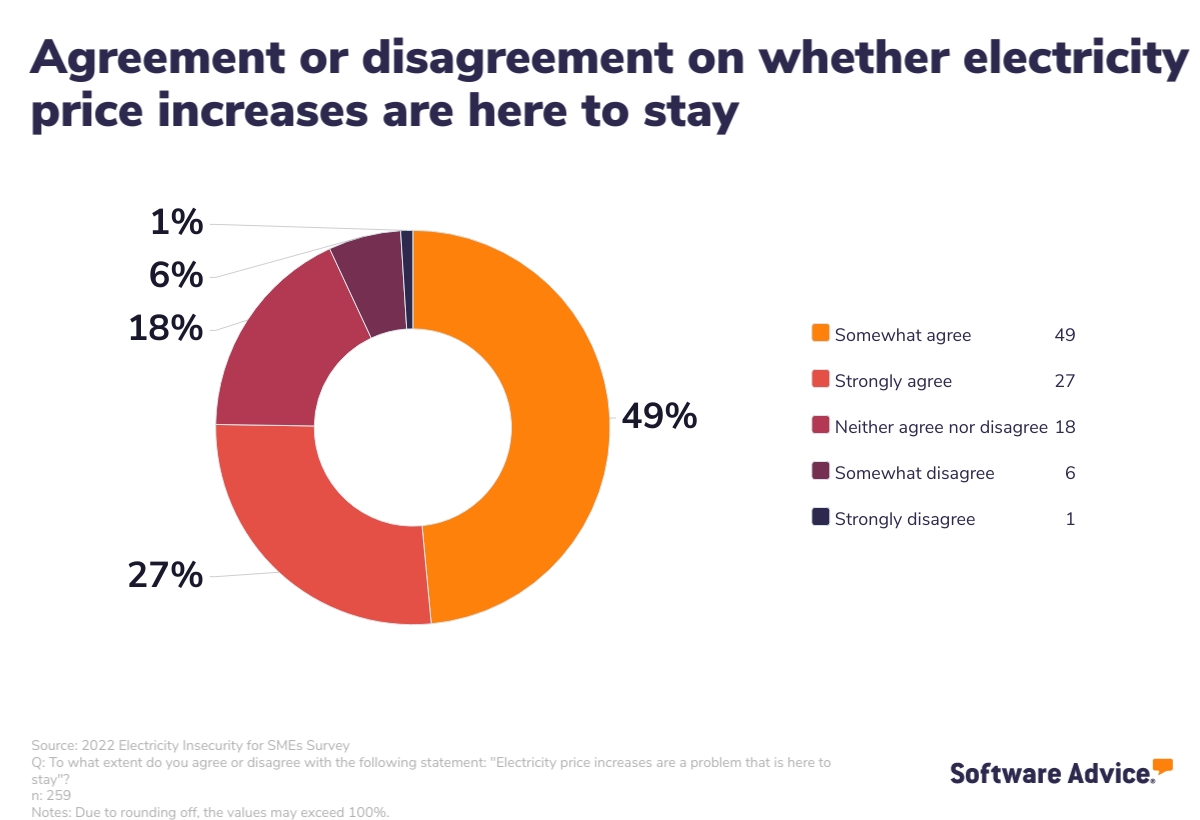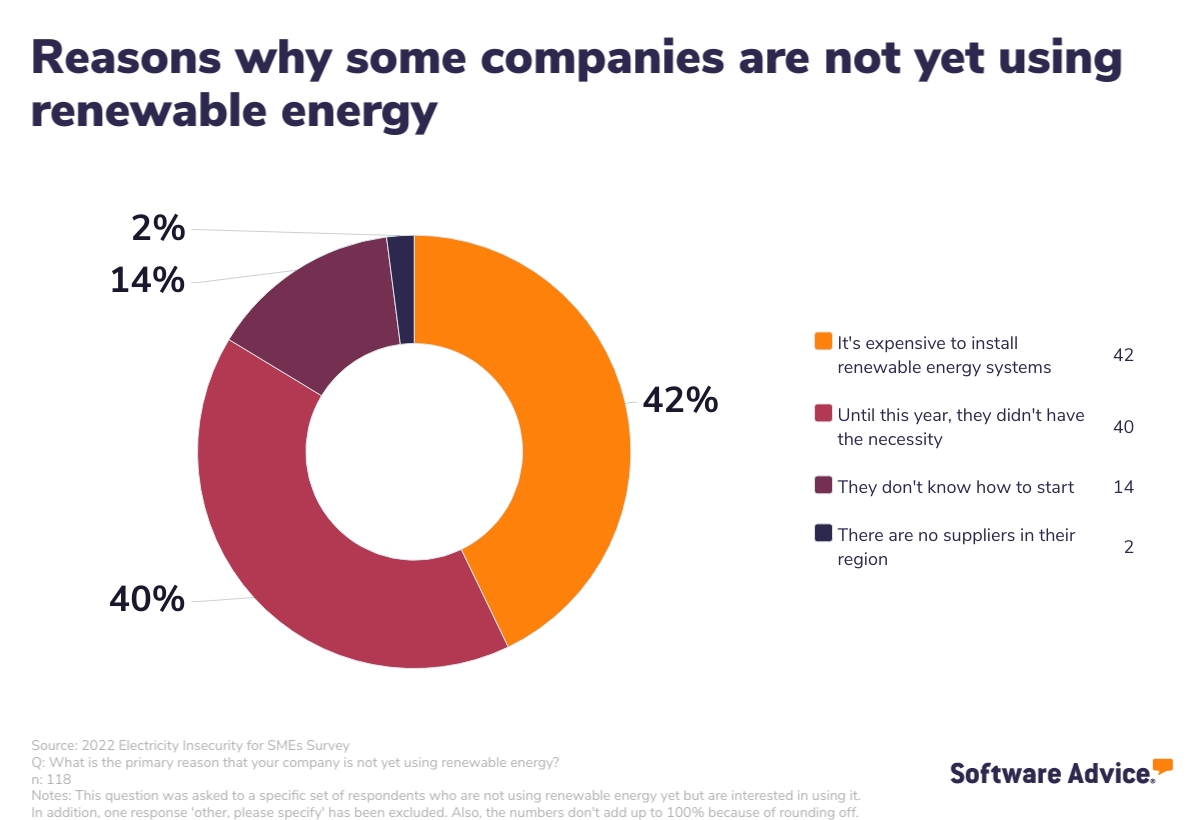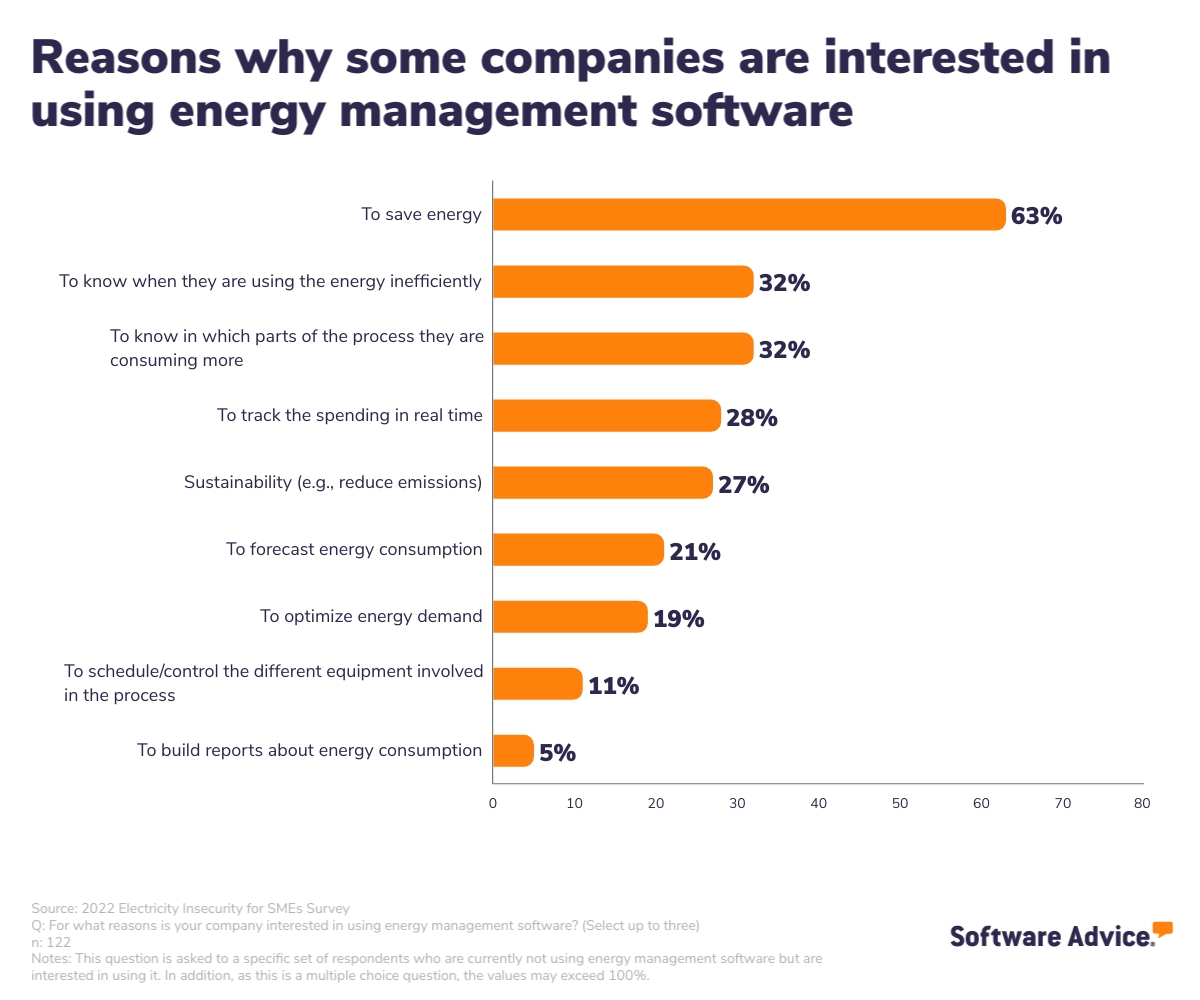76% Aussie decision-makers feel electricity price rises are here to stay
Published on 17/01/2023 Written by Ojasvini.
What do the decision-makers of Australian companies feel about the continuing increase in electricity prices? Is employee welfare getting affected by this surge in prices? Are these companies willing to use renewable energy sources? Are they aware of energy management software? Read more to find out the answers to these questions.

In this article
Electricity insecurity can impact the productivity of small to midsize enterprises (SMEs) belonging to varied industries such as manufacturing, construction, hospitality, and other such sectors. Businesses should aim at implementing energy-saving policies within their workspace such as access to alternative supplies of energy including renewable energy sources.
To understand what companies are doing to mitigate the effects of the electricity shortage, Software Advice interviewed 259 Australian respondents who are either owners, executive managers, or senior managers —meaning the decision-makers— of Australian SMEs. The survey is divided into two parts where part one specifically discusses what electricity price changes the participants have experienced, what their companies are doing about it, and more about general energy consumption. In part two, we will discuss questions such as do Australian companies obtain any of their energy from renewable sources, is employee welfare affected by these price increases, and their awareness regarding energy management software. For the full methodology, scroll to the bottom of this article.
Majority feel electricity price increases are here to stay
To understand what the participants feel regarding the electricity price increase problem, we asked them for their agreement/disagreement on whether they think these price increases are here to stay. This is what they answered:

Clearly, as per our data, a combined total of 76% of respondents feel that electricity price increases are a problem that is here to stay —with 49% of them somewhat and 27% strongly agreeing with the statement. The reasons why these respondents are agreeing with the statement involve their understanding of having experienced frequent power outages and seen an increase in electricity bills, as observed in part one of this survey.
64% said their companies took measures against this
A combined total of 81% of respondents who said yes to electricity price increases impacting their company’s performance were asked whether this increase made their companies reduce the use of temperature control systems or not. Unsurprisingly, 64% of them said this hike made their company reduce the use of temperature control systems —e.g. air conditioning/fans/heating— in the work environment. The remaining 36% of respondents, however, said that this increase neither made their company reduce the use of air conditioning/fans to combat the heat nor reduce the use of heating to combat the cold.
Majority feel that employee welfare has been affected
The 64% of respondents who said that the electricity price hike made their company reduce the use of temperature control systems were further asked the following question: ‘To what extent do you think that the welfare of employees in the workplace has been reduced due to the need to save electricity?’ This is what they answered:

Evidently, the majority (a combined total of 65%) of the respondents believe that the welfare of employees in the workplace has been reduced due to the need to save electricity —with 59% saying that it has been slightly reduced and 6% saying that the effect has been significant.
Do companies get any of their energy from renewable sources?
Delving deeper into understanding what companies are doing to combat the hike in the cost of energy, we asked respondents whether their companies currently obtain part of the energy they use from renewable sources. These are the responses we got:
- 46% of the respondents said ‘no’ to their companies obtaining part of the energy they use from renewable sources, but also said that they are interested in doing so
- 32% of the surveyed respondents answered with ‘yes’
- 12% of them were not sure about the fact, and the remaining 10% answered ‘no’ and added that they are not even interested in doing so
Moving forward, the set of respondents who said ‘yes’ to the above question were further asked what source of renewable energy they use. 84% of these respondents answered stating they use solar panels, followed by 21% saying hydroelectric, and 7% of them answering with eolic, meaning wind energy.
The same set of respondents was further asked whether their company plans to increase the use of renewable energy or not. To this, the majority of the respondents (77%) said ‘yes’ and the remaining 23% of them said ‘no’.
The above data indicates that only some companies are using renewable energy sources in any form. This could possibly mean that there might be a lack of awareness regarding the topic or that there are enough regulatory policies in the company.
Reasons why some companies are not yet using renewable energy
Of those respondents who stated that their company doesn’t obtain their energy from renewable sources but are interested in doing so were asked the primary reason behind not using such sources yet. This is what they answered:

It is clearly distinguishable from the above statistics that renewable energy sources being expensive is the biggest reason for some companies not opting for it, followed by them not feeling the necessity, as well as a lack of knowledge and awareness.
Going forward, the same set of respondents were again asked by when they expect to start using renewable energy in their company. To this, 44% of the survey takers said that they are planning to start using renewable energy next year (2023), followed by 29% of them agreeing to use it in the next two years (2024), and 10% of the respondents agreeing on using it in more than two years time (after 2024).
Majority know what energy management software is
To understand the software needs of companies, we asked respondents whether they were aware of the existence of energy management software or not. This is what they answered:
- 44% of the survey-takers said that they knew the concept but not the name
- 22% of them said they exactly knew what energy management software is
- 21% said that they neither knew the concept or the name
- The remaining 13% of the participants knew the name but not the concept
What is energy management software and how can it help combat electricity price hikes?
Energy management software are tools that offer benefits such as utility bill tracking, real-time metering, energy price analysis, emissions monitoring, and more. Such tools can potentially help organisations streamline their energy management tasks such as analysing energy usage, identifying waste, and help save money while managing daily operations and facilitating the implementation of energy-saving measures.
Only a few companies are using energy management software
When we asked the survey takers whether their company is currently using energy management software, these are the responses we got:
- 47% of the respondents said ‘no’ to using energy management software but also mentioned that they are interested in starting to use it
- 25% of them said ‘yes’ to have recently started using such software because of electricity price increase
- 12% of the participants said ‘yes’ to have been using the software for a long time
- 17% of the survey takers answered with a complete ‘no’ and also showed disinterest in using such software going forward
Why are companies interested in using energy management software?
The respondents who said ‘no’ to using energy management software but also mentioned that they are interested in starting to use it were asked the reasons behind this interest, and we observed the following:

In addition to this, the same set of respondents were asked the reason why their company hasn’t installed energy management software yet. 40% of the participants said that until now they didn’t consider it important, followed by 36% saying they didn’t realise how useful it could be. 21% said they don’t know how to install/use the software and 20% mentioned that it is expensive.
In summary
Our survey results clearly show that the majority of Australian respondents feel that the ongoing electricity price increase problem is here to stay. In addition, the majority of our participants confirmed that their companies have taken some measures to cope with this increase in electricity prices.
Companies should ideally be rationing energy and start looking into more significant ways to minimise their energy usage. Having said that, businesses can also consider using energy management software to better manage their daily energy-related costs and other tasks. Our survey revealed that the majority of the respondents know what energy management software is but only a few companies are using it. That being said, companies should ideally build an effective strategy to cut their energy consumption costs and switch to using more renewable energy sources.
Methodology
To compile data for this report, Software Advice conducted an online survey from 27 October to 7 November 2022, gathering the participation of 259 Australian respondents. The selection criteria for participants were as follows:
- Owners, executive managers, or senior managers of Australian small to midsized enterprises (SMEs) having between 2-250 employees
- Respondents working in companies having a physical workplace/office at which a significant portion of employees regularly attend
- Companies being at least one year-old
- Companies that:
- Manufacture and sell products
- Buy products from other manufactures and resell them
- Manufacture products as well as buy them from other manufactures to sell them
- Companies either selling products or services (including software) or both with the following business model:
- Business to business (B2B)
- Business to consumer (B2C)
- Business to government (B2G)
This article may refer to products, programs or services that are not available in your country, or that may be restricted under the laws or regulations of your country. We suggest that you consult the software provider directly for information regarding product availability and compliance with local laws.
